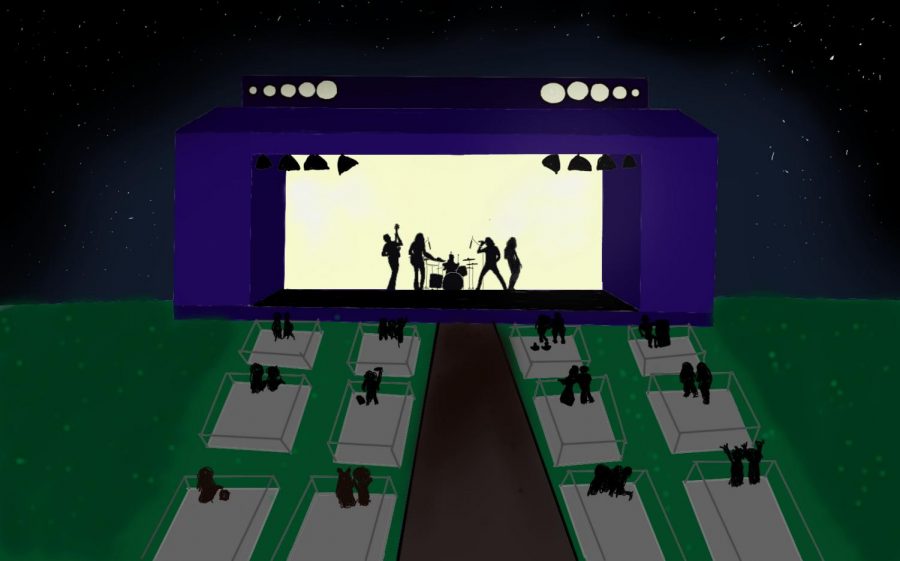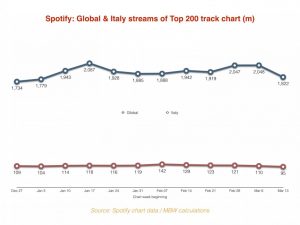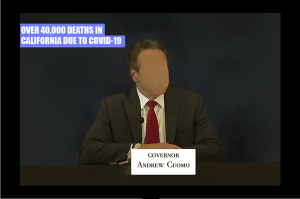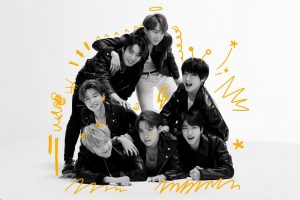COVID-19 pandemic spurs creative alternatives to live music
Fans attended experimental “platform concerts” in August, in which individual parties were seated in private sections to enjoy live music while social distancing.
October 2, 2020
As COVID-19 case numbers continue to rise, music-lovers around the world fear that they will no longer be able to attend live music events. The music industry has suffered as touring revenue has almost completely plummeted to zero. However, ingenious solutions have arisen from the pandemic as artists find alternatives to typical in-person concerts.
If the events of 2020 have taught us anything, it’s that technology is one of the largest unifying forces for people in all countries. This utilization of online platforms has created opportunities for innovation. Benji and Joel Madden of the rock band “Good Charlotte” founded a new streaming service called Veeps that allows creators to ticket their live-streams for low prices without a commission fee, a novelty that artists from multiple genres have utilized, such as Liam Payne and Brandi Carlile.
“We really have a vision for an artist-led industry,” said Benji Madden. “We hope that other artists look at our companies and start their own companies.”
In Asia, the K-pop industry might even be faring better with online concerts compared to pre-pandemic times. Korean music groups like SuperM and TWICE have taken advantage of the fact that most of their fanbase is scattered throughout the world, and as a result they have been hosting large live-streams that allow for wide geographic reach, generating thousands in revenue. According to Forbes, boy-band powerhouse BTS’s Bang Bang Con: The Live set made Guinness Book of World Records history as “the most-viewed live streamed concert ever with over 756,000 fans from across the world tuning in.”
There are, however, a few downsides to this newfound online success because of online ticket prices and time zone differences. Tamar Herman for Forbes wrote that while ticket costs are below average at around $30 USD, the tickets aren’t always adjusted to the local currency of the buyer, leaving many unable to afford them. International listeners also often have trouble tuning into live concerts due to time zone differences.
Furthermore, listeners have noted the disconnect between artist and audience during online concerts, due to the lack of interaction. Further concerns are the seemingly constant technology issues, causing music industry workers to develop safer in-person methods of watching live music.
Sam Fender, a British indie rock artist, recently headlined the first major social distance outdoor gig in the U.K. The concert took place on Aug. 11 at the newly designed Virgin Money Unity Arena in Newcastle upon Tyne in northeast England. The arena was specifically designed for COVID-19-compatible events, and uniquely features 500 platforms situated six feet apart for individual parties of up to five to watch the show at a safe distance. 2,500 people attended the sold-out concert at a venue that could have normally held a capacity of 45,000. Ticket costs were significantly less than that of a normal capacity concert. For additional precaution, venue staff escorted concertgoers from their cars to their assigned platforms and brought them pre-ordered foods and drinks.
Many took to social media to share their opinions of what may become a new norm for live music. Some believed that the platforms would block views or lack ambience. A Twitter user named Ashley Smith wrote, “If that’s what the future is, count me out … it’s the atmosphere of being surrounded by others captivated by what’s going on on the stage loving life.”
Others, including most of the fans in attendance, were satisfied by the thorough setup and many enjoyed the personal space and privacy. “My hatred for human contact with people I don’t know really, realllyyy [sic] approves of this,” commented another Twitter user, according to National Music Express.
In an interview for Variety magazine, Fender said, “Of course it’s not going to have the same vibe as a gig where there’s a mosh pit and then people having to go to the emergency room … But when we went on stage, there were two and a half thousand people singing the songs back to us … It was fantastic. It was a show. And that’s what we need.”
Artists have also experimented with drive-in concerts, where attendees can stay in the safety of their car or climb onto their roof in a mask. An event series called “Concerts in Your Car” began at the Ventura County Fairgrounds in Southern California in June, where a maximum of 500 cars enjoyed a live, in-person performance. The stage offered a sound system that transmitted the music into the radios of the cars and massive LED video monitors for fans in any parking spot to receive the maximum experience.
“This is a completely new experience. You’re not a drive-in movie theatre. But it’s not your traditional concert, either. It’s something that is going to be a pretty epic experience,” CBF Productions founder Vincenzo Giammanco, host of the event series, said.
Though artists and fans can’t experience the rush of adrenaline of a traditional concert, these substitute events could potentially put millions of dollars back into the local and national concert industry. Pollstar reported that the COVID-19 concert industry has since lost $9 billion in comparison to the $12.2 billion that live music gains annually.
With many scheduled concerts being postponed or canceled altogether, fans are in a rush to get their money back. AEG’s Coachella was the first major music festival to offer a full refund for tickets, which caused 40% refund returns, which then prompted a cash flow crisis. Since their offer, they have reached a low of losing 67% of their worth, which is why many companies are hesitant to return the millions of dollars being held in ticket sales back to the ticket holders. But at the same time, fans are angry that hundreds of thousands of dollars are out of their pockets. Ticket market leader StubHub claims that giving every fan a refund due to the pandemic would be economically harmful.
Though music-lovers continue to support their favorite artists through these safer versions of live concerts, it will be a long time before there will be any sense of normalcy. Even post-COVID-19, concerts will look different. Big-name artists who easily sell out venues of over 20,000 people can’t expect to hold a concert of that magnitude anytime soon.
Travis Rieder, assistant director of education initiatives and research scholar at the John Hopkins Berman Institute of Bioethics, told USA Today that the absence of a vaccine, a shortage of testing, and the near-impossibility of contact tracing every attendee in a large venue hinders the possibilities of typical in-person concerts continuing in the near future. Nonetheless, different ways to experience live music are actively being tested in the music world. Face masks, social distancing, temperature checks, and hand sanitizer will all be anticipated precautions for any sort of in-person event in the time being. It will be hard to regain the trust of a large event anytime soon.
“The risk of those events as we would have done them in the past outweighs the benefit of doing them. We are flexible creatures. We’re going to have to do things differently. We can find ways to do the things we love,” Rieder said.







